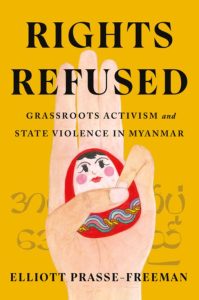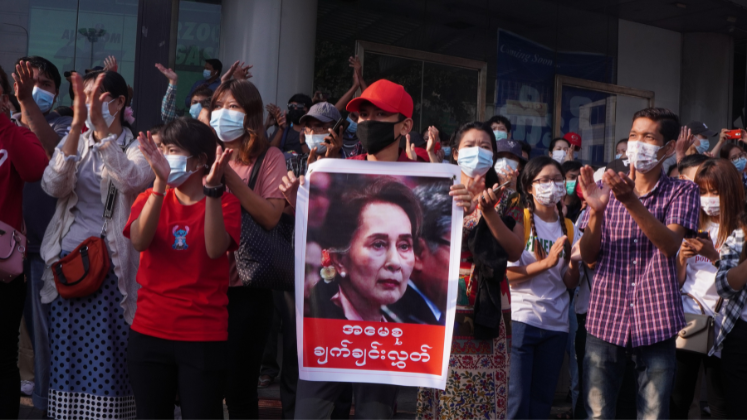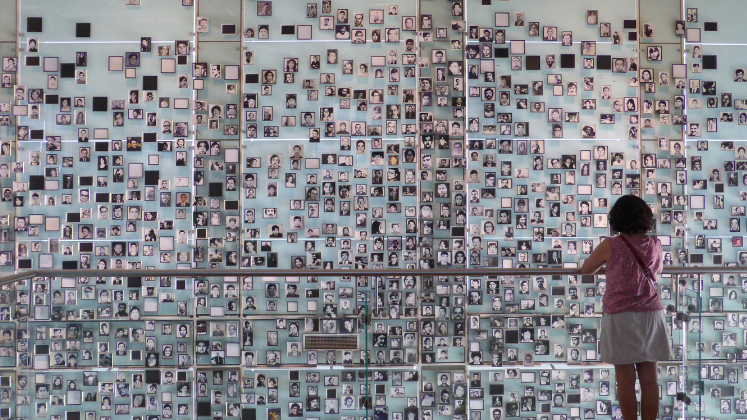In Rights Refused: Grassroots Activism and State Violence in Myanmar, Elliott Prasse-Freeman documents political activists’ struggle in Myanmar, covering the so-called “democratic transition” from 2011-2021 and the February 2021 military coup the ongoing mass uprising against it. According to Thanapat Chatinakrob, the book’s meticulous research and compelling narrative provides profound insights into the complex interplay of grassroots movements and state violence in Myanmar. This post was originally published on the LSE Southeast Asia Blog.
On Wednesday 1 November at 12pm (noon), Elliott Prasse-Freeman will speak at a hybrid event hosted by LSE Saw Swee Hock Southeast Asia Centre. Find details and register here.
Rights Refused: Grassroots Activism and State Violence in Myanmar. Elliott Prasse-Freeman. Stanford University Press. 2023.
 Rights Refused: Grassroots Activism and State Violence in Myanmar by Elliott Prasse-Freeman stands as an illuminating exploration of the intricate dynamics between grassroots movements and state violence in Myanmar. Prasse-Freeman embarks on a journey that unveils the indomitable power of resilience among those who adamantly reject oppression. Divided into three distinct sections, the book weaves a narrative tapestry that invites readers to traverse the multifaceted terrain of activism in the face of state violence.
Rights Refused: Grassroots Activism and State Violence in Myanmar by Elliott Prasse-Freeman stands as an illuminating exploration of the intricate dynamics between grassroots movements and state violence in Myanmar. Prasse-Freeman embarks on a journey that unveils the indomitable power of resilience among those who adamantly reject oppression. Divided into three distinct sections, the book weaves a narrative tapestry that invites readers to traverse the multifaceted terrain of activism in the face of state violence.
The first part, “Blunt Biopolitics,” (Chapter 1) confronts readers with an unflinching examination of the systematic violence perpetrated by the Myanmar state against its citizens. The term “blunt biopolitics” encapsulates the brutal methods employed by the government to suppress dissent and maintain control. Prasse-Freeman skilfully employs gripping narratives and incisive analysis to vividly illustrate how the Myanmar government deploys a range of coercive measures, leaving no room for opposition. This section serves as a powerful prologue, laying the groundwork for the subsequent exploration of grassroots rightful resistance. It underscores the magnitude of the challenges faced by activists in Myanmar and sets the stage for their inspiring narratives.
Prasse-Freeman skilfully employs gripping narratives and incisive analysis to vividly illustrate how the Myanmar government deploys a range of coercive measures, leaving no room for opposition.
The heart of Rights Refused lies in the second part, aptly titled “Lives of Refusal.” This multifaceted exploration dives deep into the lives of those who courageously defy oppression. Within this section, several subsections provide insights into different aspects of grassroots resistance.
“Living Refusal” introduces readers to that concept, a notion that encapsulates the transformation of ordinary individuals into resolute activists. Through poignant stories and personal narratives, Prasse-Freeman introduces individuals who exemplify the unwavering determination of the human spirit in the face of adversity (Chapter 2). “Plow Protests” delves into the unconventional, yet highly impactful form of resistance known as plow protests. Here the author illustrates how these unique acts became potent instruments for change, offering readers a glimpse into the ingenious methods employed by Myanmar’s citizens to challenge the oppressive regime. The stories of plow protests serve as a testament to the creativity and resourcefulness of those striving for change in the most challenging circumstances (Chapter 3). “Cartoons, Curses, and the Corpus” further explores the innovative strategies employed by Myanmar’s people, including art, language, and folklore, to voice their dissent. Through vivid exploration, readers gain insight into the creative approaches that underpin grassroots activism in Myanmar. These sections illuminate the resilience and adaptability of activists who utilise unconventional means to challenge an authoritarian regime, offering a rich tapestry of inspiration (Chapter 4).
Prasse-Freeman critically examines the role played by the global human rights movement in advocating for human rights within [Myanmar].
The final part, “Rights as Opportunities,” shifts the focus to the significance of human rights within Myanmar’s struggle for freedom (Chapters 5 and 6). Prasse-Freeman critically examines the role played by the global human rights movement in advocating for human rights within the nation. This section challenges readers to reconsider their understanding of rights, encouraging them to view rights not just as legal principles but as opportunities for profound transformation. The discussion on rights in desperation offers a poignant reflection on the dire circumstances faced by activists, emphasising the moral imperative of international support. It underscores the critical role that the global community can play in bolstering activists on the ground.
Prasse-Freeman’s adept structuring of Rights Refused is a testament to his commitment to delivering a coherent and engaging narrative. The book’s three-part structure ensures that readers are guided through a progressive exploration, gradually deepening their understanding of Myanmar’s human rights struggle. The carefully organised sections facilitate a seamless flow from one part to another, maintaining reader engagement while highlighting the interconnectedness of the book’s themes. The subdivision of each part into subsections, such as “Living Refusal,” “Plow Protests,” and “Cartoons, Curses, and the Corpus,” enhances readability and accessibility, catering to a diverse readership.
Rights Refused transcends the confines of a mere book; it serves as a vital expedition, inviting readers to engage in a profound journey of empathy and introspection. Prasse-Freeman’s humanisation of the activists and individuals at the heart of the struggle invites readers to step into their shoes and comprehend the immense challenges they face. This book fosters empathy and encourages readers to reflect on their roles in advocating for human rights, both in Myanmar and on a global scale. In a world where human rights issues can often seem distant and overwhelming, Rights Refused bridges the gap, bringing these issues closer to home.
Rights Refused represents a significant contribution to the field of human rights literature. It transcends the realm of dry statistics and headlines, offering nuanced insights into the strategies, tactics, and narratives that shape activism in the face of authoritarianism.
Furthermore, Rights Refused represents a significant contribution to the field of human rights literature. It transcends the realm of dry statistics and headlines, offering nuanced insights into the strategies, tactics, and narratives that shape activism in the face of authoritarianism. The book’s combination of rigorous scholarship and empathetic storytelling elevates it to a valuable resource for scholars, researchers, and activists seeking a deeper understanding of human rights struggles in challenging environments.
The true contribution of Rights Refused lies in its power to inspire and challenge. It inspires readers to recognise the enduring quest for justice and dignity in the face of adversity. It challenges policymakers, activists, and the international community to reevaluate their approaches to advocating for human rights. By offering valuable lessons on the importance of solidarity and support for those on the front lines of resistance, the book underscores the moral imperative of standing with activists in their pursuit of justice and human dignity.
The book’s invitation to empathy and reflection makes it a valuable resource for readers from all walks of life.
In conclusion, Rights Refused is a masterful work that not only informs but also inspires and challenges. Its structured narrative journeys through the complexities of Myanmar’s human rights struggle ensures clarity and engagement. The book’s invitation to empathy and reflection makes it a valuable resource for readers from all walks of life. Moreover, its significant contribution to the field of human rights literature offers a nuanced understanding of activism and state violence. Rights Refused is not just a book; it is a call to action and a testament to the enduring human quest for justice and dignity in the face of adversity.
This book review is published by the LSE Southeast Asia blog and LSE Review of Books blog as part of a collaborative series focusing on timely and important social science books from and about Southeast Asia. This review gives the views of the author, and not the position of the LSE Review of Books blog, the LSE Southeast Asia Blog, or the London School of Economics and Political Science.
Main Image Credit: R. Bociaga on Shutterstock.







